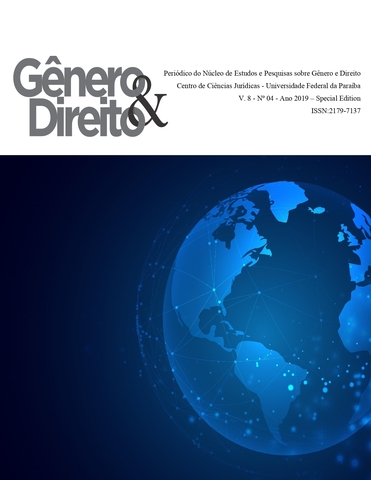DESCRIPTION OF THE CONCEPT “OLDNESS” FROM THE CULTURAL LINGUISTICS’ POINT OF VIEW IN SPANISH AND RUSSIAN (BASED ON LEXICOGRAPHICAL SOURCES)
DOI:
https://doi.org/10.22478/ufpb.2179-7137.2019v8n4.48373Palavras-chave:
old age, concept, cognitivistics, semantic field, linguistic culturology, Spanish, RussianResumo
Due to the increased attention of modern science to a man as a representative of culture, conceptual linguistics turned out to be one of the most promising directions in linguistics. The concept is a kind of semantic nest that covers a significant part of the language vocabulary. In this paper, the concept of old age in Spanish and Russian languages was studied on the basis of lexicographic sources. However, lexicographic sources are only an attempt to order a language integrated into the syncretic consciousness of a person for research purposes. The concepts are implemented in a language using semantic fields. The field theory is based on the idea of regularities and semantic links existence between linguistic units. The linguistic-cultural concept as a conventional unit can only be considered in cooperation with other concepts. The concept of old age was described in connection with the concepts of wisdom, stupidity, respect, neglect, death, life, fear, poverty and wealth.In both languages old age is understood as the phenomenon of predominantly negative nature, but with a higher percentage of units with improvement evaluation in Spanish. The obtained data will be tested in speech by the means of a free associative experiment. The research has an applied value in such related sciences as pedagogy, gerontology and sociology.Downloads
Referências
Stepanov Yu.S. Constants. Dictionary of Russian culture. Experience of research / Yu. S. Stepanov. - M.: Languages of Russian culture, 1997. - 824 p.
Likhachev D.S. The conceptual sphere of Russian language / D.S. Likhachev // Russian literature. From the theory of literature to the structure of text. - M.: Academia, 1997. - pp. 267-279.
Vezhbitskaya A. Understanding of culture through the medium of key words / A. Vezhbitskaya. - Moscow: Languages of Slavic Culture, 2001. - 290 p.
Vorkachev S.G. Linguistic culturology, the linguistic personality, the concept: the formation of the anthropocentric paradigm in linguistics / S.G. Vorkachev // Philological Sciences. - 2001 - №1. - pp. 64-72.
Fauconnier Gilles, Mark Turner The way we think, New York: Basic Books, 2003, 464 p.
Popova Z.D. The definition of "concept" in linguistic research / Z.D. Popova, I.A. Sternin. - Voronezh, 2000. - 189 p.
Moreda Pozo, Paloma; Muñoz Guillena, Rafael. “Representación conceptual basada en técnicas lingüísticas”. Procesamiento del lenguaje natural. Nº 29 (sept. 2002), pp. 231-238
Arsentieva E.F. Connotative macrocomponent of phraseological meaning [Electronic resource]. URL: www.kcn.ru/tat_ru/science/news/lingv_97/n104.htm (reference date: 20.04.2017).
Permyakov G.L. Fundamentals of structural paremiology / G.L. Permyakov. - Moscow: Nauka, 1988. - 237 p.
A.I. Galperin. Essays on the stylistics of English [Electronic resource]. URL: http://www.classes.ru/grammar/30.Ocherki_po_stilistike_angliyskogo_yazika/html/unnamed_21.html (reference date: 20.05.2017).
Fasmer M. Etymological dictionary of Russian language [Electronic resource]. URL: http://etymolog.ruslang.ru/index.php?act=contents&book=vasmer, (reference date: 15.05.2017).
Yakubova D.D. Concepto de bienestar en las lenguas española y rusa, Tonos Digital, №30, enero 2016, 23 pp.
Saharny L.V. Introduction to psycholinguistics: The course of lectures. Lecture II: the emergence of Soviet psycholinguistics in the 60-ies [Electronic resource]. URL: http://www.csa.ru/DistanceLearning/course2/ch9/ch9_1_3_1.html (reference date: 15.05.2017).
Yakubova, D.D., Gazizova, L.G Building culturally competent students in teaching Spanish as a foreign language EDUALERN 15: 7TH INTERNATIONAL CONFERENCE ON EDUCATION AND NEW LEARNING TECHNOLOGIES. EDULEARN Proceedings. 2015. Pp. 7607-7612.
Tomasello, M. Constructing a Language: A Usage-Based Theory of Language Acquisition. Harvard University Press, 2003, 388 p.
Fauconnier, G. Mappings in Thought and Language, 1997, 220 p.
Evans Vyvyan, Melanie Green Cognitive Linguistics: An Introduction. Edinburgh: Edinburgh University Press, 2006, 830 p.
Croft W., D. A. Cruse Cognitive Linguistics. Cambridge: Cambridge University Press, 2004, 356 p.
E.E. Levintova. Spanish-Russian phraseological dictionary: 30000 phraseological units / E.I. Levintova, E.M. Wolf. - M.: Russian language, 1985. - 1080 p.
Citas y refranes [Electronic resource]. URL: citasyrefranes.com/refranes/buscar/viejo/1 (reference date: 20.04.2017).
Diccionario etimológico [Electronic resource]. URL: http://etimologias.dechile.net/ (reference date: 10.04.2017).
Diccionario Real Academia Española [Electronic resource]. URL: rae.es/rae.html (reference date: 12.04.2017).
Seco M. Diccionario fraseológico documentado del español actual: locuciones y modismos españoles. Madrid: Aguilar, 2004. 1084 p.
National corpus of Russian language [Electronic resource]. URL: http:/www.ruscorpora.ru/ (reference date: 15.04.2017).
CRAE [Electronic resource]. URL: http:/corpus.rae.es/creanet.html (reference date: 12.05.2017)

